Activities
The game's 14 educational activities teach Basic vocabulary words (objects of everyday life, animals, fruits & vegetables, occupations, family members, etc.;) adjectives, verbs, numbers, prepositions, sentence structure, placing the adjective, verb tenses (present, past, future) [1]
Interactive fiction, often abbreviated IF, is software simulating environments in which players use text commands to control characters and influence the environment. Works in this form can be understood as literary narratives, either in the form of Interactive narratives or Interactive narrations. These works can also be understood as a form of video game, either in the form of an adventure game or role-playing game. In common usage, the term refers to text adventures, a type of adventure game where the entire interface can be "text-only", however, graphical text adventure games, where the text is accompanied by graphics still fall under the text adventure category if the main way to interact with the game is by typing text. Some users of the term distinguish between interactive fiction, known as "Puzzle-free", that focuses on narrative, and "text adventures" that focus on puzzles.
JumpStart was an educational media franchise created for children, primarily consisting of educational games. The franchise was developed by JumpStart Games and expanded beyond games to include workbooks, direct-to-video films, mobile apps, and other media. It was officially launched on March 10, 2009, offering a blend of educational content and entertainment experiences.

The ClueFinders is an educational software series aimed at children aged 8–12 that features a group of mystery-solving teenagers. The series was created by The Learning Company as a counterpart to their Reader Rabbit series for older, elementary-aged students. The series has received praise for its balance of education and entertainment, resulting in numerous awards.

Zoo Tycoon is a business simulation game developed by Blue Fang Games and released by Microsoft. Although first released for Microsoft Windows and Macintosh in 2001, it was ported to the Nintendo DS in 2005. It was followed by two expansion packs, Dinosaur Digs and Marine Mania, which were released in 2002, as well as a sequel, Zoo Tycoon 2, released in 2004.

Nightmare Ned is a 1997 computer game for Microsoft Windows that was developed alongside the animated series of the same name. The game was based on a concept by Sue and Terry Shakespeare. It was released on October 7, 1997.

The Final Scene is the fifth installment in the Nancy Drew point-and-click adventure game series by Her Interactive. The game is available for play on Microsoft Windows platforms. It has an ESRB rating of E for moments of mild violence and peril. Players take on the first-person view of fictional amateur sleuth Nancy Drew and must solve the mystery through interrogation of suspects, solving puzzles, and discovering clues. There are two levels of gameplay, including a Junior and Senior detective mode. Each mode offers a different difficulty level of puzzles and hints, but neither of these changes affect the actual plot of the game. The game is loosely based on a book of the same name, The Final Scene (1989).
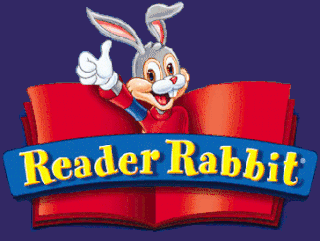
Reader Rabbit is an educational game franchise created in 1984 by The Learning Company. The series is aimed at children from infancy to the age of nine. In 1998, a spiritual successor series called The ClueFinders was released for older students aged seven to twelve.
Mark Schlichting is a publisher, author, and digital pioneer of children's multimedia and interactive design software. He is best known as the creator and subsequent Design and Art Director of Broderbund's Living Books series including the original 1994 Living Books PC game Harry and the Haunted House, one of the first lines of children's interactive book software on CD-ROM. Schlichting was Design and Art Director for Living Book's first interactive CD-ROM book adaptation, Mercer Mayer’s Just Grandma and Me, which was one of the first software titles accredited as a school textbook and used as a product demonstration by Apple CEO John Sculley.

Kutoka Interactive was an educational software company founded in Montreal, Quebec, in 1995. The company produced, developed, and distributed both subject-based and grade-based video games for Windows and Macintosh from 1996 to 2017. They were most famous for their Mia games.
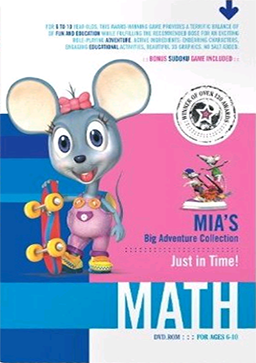
Mia's Math Adventure: Just in Time! is the third title of the Mia's Big Adventure Collection software series created by Kutoka Interactive. Released in 2001 in Canada and the United States, the game teaches mathematics to children between 6 and 10 years old.

Mia's Science Adventure: Romaine's New Hat is the second title of the Mia's Big Adventure Collection software series created by Kutoka Interactive. Released in 2000 in Canada and the United States, the game teaches sciences to children between 6 and 10 years old.
Mia's Big Adventure Collection is an edutainment software series created in 1998 by Kutoka Interactive. The series consists in five subject-based titles for children in elementary school.

Mia's Reading Adventure: The Bugaboo Bugs is the latest title of Mia's Big Adventure Collection software series created by Kutoka Interactive. Release in late 2007 in Canada and the United States, the game teaches reading to children between 5 and 9 years old.
Didi & Ditto is an edutainment software series created in 2003 by Kutoka Interactive. The series consists in three grade-based titles for preschool, kindergarten and first grade.
American Girl is a series of video games developed by various studios and distributed by American Girl.

Disney's Animated Storybook is a point-and-click adventure interactive storybook video game series based on Walt Disney feature animations and Pixar films that were released throughout the 1990s. They were published by Disney Interactive for personal computers for children ages four to eight years old. Starting from 1994, most of the entries in the series were developed by Media Station. They have the same plots as their respective films, though abridged due to the limited medium.
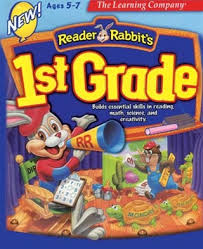
Reader Rabbit's 1st Grade is an educational video game, part of the Reader Rabbit series, developed by KnowWare and published by The Learning Company on January 14, 1998. The game was re-released on the Nintendo Wii by Graffiti Entertainment on May 4, 2010.

Thinkin' Things is a series of educational video games by the Edmark Corporation and released for Windows and Mac in the 1990s. Entries in the series include Thinkin' Things Collection 1 (Formerly Thinkin Things) (1993), Thinkin' Things Collection 2 (1994), Thinkin' Things Collection 3 (1995), the adventure game Thinkin' Things: Sky Island Mysteries (1998), Thinkin’ Things Galactic Brain Benders (1999), Thinkin' Things: All Around Frippletown (1999) and Thinkin' Things: Toony the Loon's Lagoon (1999).
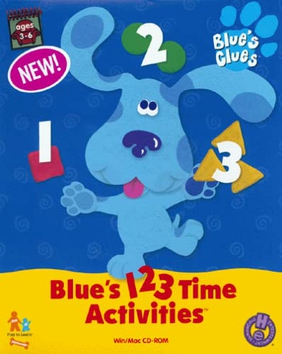
Blue's 123 Time Activities is a 1999 educational game developed and published by Humongous Entertainment. The game works on Windows 95 and above, and on System 7.5.3 to Mac OS X Tiger. It was the third game in the Blue's Clues video game series, in turn based on the television series of the same name.
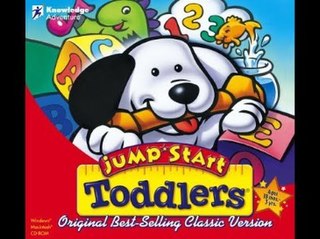
JumpStart Toddlers is a 1996 educational video game, the fourth within the JumpStart franchise. An enhanced version was released in 2000.














